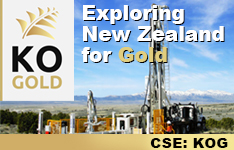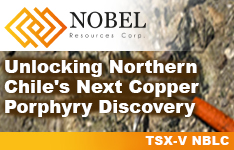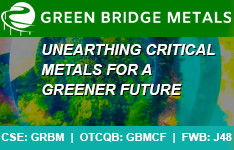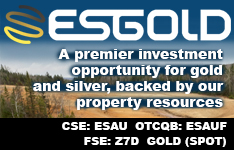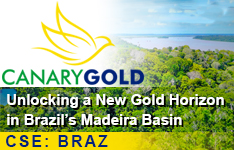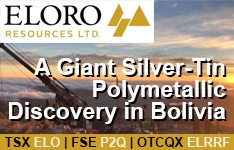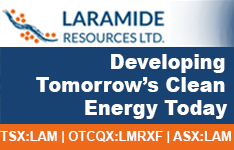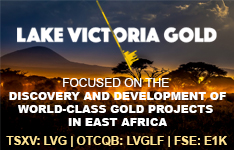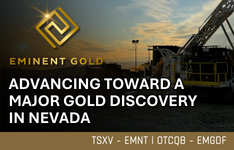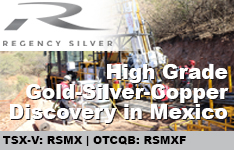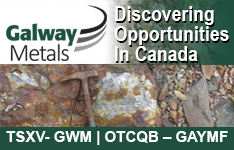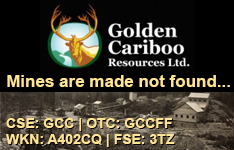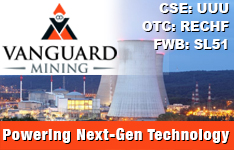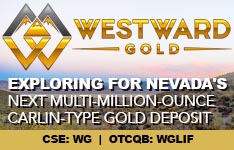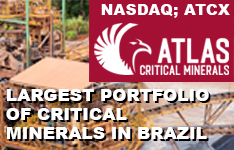Brent Cook: I would guess, on a statistical basis, the odds of any single property producing a discovery that turns into a mine are worse than 1 in 1,000. The advantage I have, as a geologist with 30 years in exploration, is that I've seen enough and been to enough projects to know the difference between a project with potential and one with absolutely none. I can improve those odds a lot.
That said, I agree fully with what Rick said. For a number of years, we've raised tens of billions of dollars across the industry for exploration for all metals, and a lot of that is starting to come to fruition. We're seeing a lot more discoveries, or potential discoveries, with the drill bit than we've seen in a long time. That's a factor of two things.
One is the amount of money raised. The second is that, compared to the boom in 1997, when we were all young and making and spending money hand over fist, the people in the industry are much more serious this time around. That has to do with the overall fact that we're 13 years older, and most of us have had the opportunity to lose all our money that we made the first time around. That was a very expensive lesson. This time, there are a lot more good exploration programs and legitimate discoveries, or apparent discoveries, coming on line.
TGR: You stated, in one of your recent reports, that some of these people who were involved in 1997 are still around, and they're more sophisticated, including "the companies, the investors and the swindlers." Considering this, how are you picking companies that merit value?
BC: I know the sorts of deposits that make money versus those that really don't. I'm fairly focused on big discoveries. I'm not interested in small projects or mines. There are geologic environments that I tend to ignore, just because, for the most part, they don't produce large deposits. Knowing that, we can screen out half the deposits or projects right off the bat and immediately narrow the field of possibilities. Many of these properties get recycled and they may come up under a different name. I often know the property from five years ago, when somebody drilled it, and five years before that when somebody else drilled it. These things keep getting recycled and are usually a waste of time and money. Occasionally they work, but usually they don't. Again, you know the people as well. People are a big part of this junior exploration game. Although scamsters, frauds or hucksters can make a discovery, you're much better off screening out all but the best people. I'm referring to the legitimate, hardworking people who are aligned with your interests—meaning they own a lot of the same stock that you're looking to buy.
TGR: How important is management versus the geology itself in a junior for finding the kind of discovery that you would get involved in?
BC: I look at the geology first. If it passes, that's my biggest screen. Then I look at the people and make a decision based on what I know about them, discussions with them, their track record, and how involved they really are in the company. Is this their only job, or have they got three other jobs that they're working? I go through the balance sheets and see how they're actually making their money. The number-one factor, though, is what the rocks are actually saying.
TGR: What if the geology is incredible and the people are not?
BC: If the geology is great and it looks like a discovery, I'll go there, even if the people are questionable. However, you've got to keep that in the back of your mind and that tempers the target price you are willing to sell the stock at. You've got to watch very closely how they waste their money or how they conserve it. Management will ultimately add a discount or premium to the value of a discovery.
TGR: If management is questionable and the company eventually fails at making the property valuable, does that factor into future endeavors as far as you're concerned?
BC: Yes. We always keep track of what's happened to other projects, for example, a project that was a good project and was drilled improperly, or the guys went broke on it doing silly things somewhere else. I've got a list of properties I'd certainly like to get back to and see some work done on. I'm just waiting to see who does what on them. That's just part of the background you gain over the years.
TGR: Do you believe that there is currently any oversupply in commodities?
BC: I believe that we've had stockpiling and speculative money coming in the base metal sector and to some degree gold and silver as well. That's a direct result of all of the stimulus and such that's been pumped out by most countries around the world to try to get out of this recession they got us into. Not all of that money is going into legitimate, sensible business transactions. Much of that is going into speculative investments, metals in particular.
Until just recently, the copper inventories were at very high levels. If the price is going up as well, that's counterintuitive to what should be going on. I'm also a bit concerned about China in that we don't really know what's going on over there with the financial numbers they report. We've got no way of checking that and their measure of GDP is different than ours. They measure production not by what is being sold, but what is manufactured. That factors into their GDP, which can lead to somewhat of a misunderstanding as to what their market is.
I am cautious, and probably won't do much in the base metals sector unless I see real value. In the gold sector, I'm reasonably active. It really comes down to valuations of what a company has, or may have, versus what you're paying to get in—basically, a risk-to-reward judgment. I'm concerned about some of the risk-to-reward valuations we're paying now for what amounts to really high-risk exploration plays. Gold is not at $1,100 an ounce because all the juniors who claim they have a deposit actually do.
TGR: Are you staying away from companies that are doing business in China as a whole, or will you risk that area?
BC: I don't think China is a good place for junior companies to be exploring. There's not one major mining company actively involved in China. The largest mid-tier is Eldorado Gold, which has one deposit there and is putting another one into production. Other than that, there are no majors in China. The juniors that have gone there have all come back with their tails between their legs. That's because of the difficulty doing business there. The properties that are made available are those that have problems. The mineralogy or the location is bad, etc. I don't think that's a place to be putting money in the junior exploration sector.
TGR: What part of the world do you favor right now?
BC: Certainly West Africa is a developing, improving area. I think most Latin American countries are OK, with the exception of Ecuador, Venezuela and Bolivia. And certainly Canada, some U.S. states, Mexico, and, of course, Australia, are good. That's probably where I'm focusing for the most part, although, I am headed off to Eurasia to look at a few projects next month.
TGR: What's interesting in West Africa?
BC: I was just over there visiting with Mineral Deposit Ltd. (TSX:MDM; ASX:MDL) in Senegal, Oromin Explorations Ltd. (TSX:OLE), Riverstone Resources Inc. (TSX.V:RVS) in Burkina Faso, and I looked at Cluff Gold PLC (TSX:CFG;LSE:CFG) and IAMGOLD Corporation's (NYSE:IAG;TSX:IMG) Essakane project.
Of those, Riverstone is probably one of the most interesting, although the market capitalization on that is beyond what I think the risk-to-reward warrants right now. I am watching that closely, but I think right now, it's better to see some real drill results so we know what we've got and to dispel some geological concerns I have. The risk-to-reward is just not there, with a $80 million market cap right now for a drill hole play. Keegan Resources Inc. (TSX:KGN;NYSE.A:KGN) has a good project, as well as Perseus Mining Ltd. (TSX:PRU;ASX:PRU). Perseus has a lot of ounces and they're putting that project into production. However, in general, I feel the market is somewhat overvalued for the risk that you're taking in these stocks.
TGR: Are you taking profits now?
BC: In this week's letter we took profit on a stock we bought, oh, five or six months ago. We got almost a triple on it, and yes, I'm taking profit on it.
TGR: What strategies do you employ when structuring your portfolio?
BC: I've got sort of a three-tiered portfolio in the letter. There's one portfolio I call a gambling portfolio. This is where we're just betting on a drill hole. The geology looks good, and the size of the system is large enough that if they find something, it's significant. Yet it's a very high-risk speculation.
The main portfolio is comprised of two types of companies. One is actual investments where we're able to buy the company at or near its net asset value. If a company has $200 million in the bank, we're buying it for a market cap of $200 million and there are some smart people running it. We have a few companies like that in the portfolio. The other side of it is more speculative, but again, we got in at better valuations. There are intelligent people running the company exploring for projects that, if successful, will be significant discoveries. It's not so much a gamble. I've got more confidence in the company, the property and the valuation. The valuations of these are better when we buy them than the gambling stocks.
TGR: How have you done overall?
BC: In the main portfolio, we've obtained increases up to almost 900%, with many of them in the 100% range. One company that's been there for quite a while is called Altius Minerals Corp. (TSX.V:ALS), a very smart group of guys. They've shown over a 10-year period that they've returned an approximate 30% annual greater compound rate of return. You're buying that for just a little bit over net asset value, depending on how you value some of the projects that are in their portfolio. Blue Sky Uranium Corp. (TSX.V:BSK) is another company I like at the other end of the spectrum. That's an exploration play in Argentina. The geology is such that they've certainly got mineralization. The mineralization appears to offer a good, cheap, inexpensive production cost over a large area. If they're successful in drilling, this has got a good chance of being a major uranium deposit.
TGR: Are there other energy-related companies that you like?
BC: Geothermal power is something that is getting overlooked as an inexhaustible supply of power if you can tap into it. There are two major companies that I'm aware of and have spent time on. Ram Power Corp. (TSX:RPG) is further along in terms of developing their energy and you can see where the cash flow comes from. Magma Energy Corp. (TSX:MHY) is more on the exploration side, although they just picked up a geothermal resource and a power plant in Iceland. I haven't actually bought those in the portfolio yet, but I can see adding those to my personal portfolio.
TGR: Didn't you cover Magma in one of your newsletters?
BC: That's Magma Metals Ltd. (TSX:MMW; ASX:MMW). That's pretty interesting as well. It's an Australian group that made a platinum palladium discovery up near Thunder Bay, Ontario. They've got a resource. You know the company's probably at a fair valuation based on that resource. But the geologic setting is such that somewhere in the area they're working there is probably a major high-grade platinum palladium plus nickel and copper deposit. Finding that is going to be really tough. It may be impossible, but that's what they're going for. This is a stock we bought early on. We've sold a portion of it. We own it for almost nothing, and we're sitting there with the chance that if they find this high-grade deposit, we could have a 10-bagger. That's the sort of investment I like to do.
TGR: You mentioned Latin America. What do you like down there?
BC: I like Lara Exploration Ltd. (TSX.V:LRA). I've known Miles Thompson, the president, for quite a while. We worked in Brazil together. Lara is another company that follows the joint-venture model. He's got iron and nickel projects going in Brazil. They have porphyry copper in Peru that's been taken up by a joint-venture partner. He recently acquired a company that has projects in China, and those Chinese projects are being pushed out to joint venture with other companies. So they're doing quite well. With the iron project, there's the potential that they begin generating revenue from that, an advance royalty payment of sorts. The company may be self-funded in its exploration, which is great.
TGR: How do you feel about Colombia these days?
BC: I just posted a commentary on my website, after a trip to Colombia, that goes through some of the issues there. It is free to anyone reading this at Exploration Insights.com. Geologically, it's one of the best gold provinces in the world. You've got three tectonic plates jostling together there, as well as volcanoes. These things combined to produce a multitude of environments where gold forms. There's so much gold there it's difficult for an investor to differentiate between the hundreds of small veins that don't amount to much and the five or ten that are going to amount to real deposits. It was a dangerous place in the past and remains somewhat dangerous now. It's improved remarkably, but there are parts of the country you still cannot go. Some of those have gold. Some don't.
TGR: Who are you following there?
BC: Miranda Gold Corp. (TSX.V:MAD) is as much a people bet as a geology bet. I know the guys running it and I've spent time with the geologist there. It's a top-notch group. They've recently moved down into Colombia, and they've been active in Nevada. Nevada and Colombia are two of the best places in the world to be looking for gold, for sure. Miranda does it intelligently in that they follow a prospect generator or joint-venture model. They generate ideas and bring in major companies to spend the high-risk dollars drilling these things out. If your odds are 1 in 1,000 on any particular property, it makes a lot more sense to have somebody else spend the high-risk dollars rather than you at the expense of diluting your shareholders out to oblivion. I think they're a good group doing good work, and they're in two of the best provinces in the world to be looking for gold.
TGR: Who else are you watching in Nevada?
BC: AuEx Ventures Inc. (TSX:XAU) is another company that follows the joint-venture model, where they get other people to spend high-risk dollars on their projects. It is another very intelligent, focused, honest group with management that couldn't get any better. They made a discovery in eastern Nevada called Long Canyon. Their joint-venture partner, Fronteer, is now running that program. Fronteer has 51%. They've got 49%. They're in the process of producing a feasibility study on it, and then they'll push that into production. It's going to be a very low-cost operation generating lots of free cash flow.
Evolving Gold Corp. (TSX.V:EVG) also has a project in Nevada just south of Carlin. A recent drill hole shows they are into a Carlin system that has good grade. The geology is right and they're drilling a second hole on that right now. I've been to their Rattlesnake Hills project in Wyoming, too. They've got a lot of drill holes into it. I like the system because it's so large. So far they haven't been able to pull enough together at a high enough grade in the right location to make it economic. They're still searching, I think.
TGR: What about Nevada producers?
BC: Allied Nevada Gold Corp. (NYSE.A:ANW;TSX:ANW) is a production company with a huge deposit there called the Hycroft Mine. They've been mining the oxide from it and doing fairly well. The real upside comes from the sulfide. The difference between oxide and sulfide is that Mother Nature has rusted the ore, making it a lot easier to get the gold out of oxide. The sulfide has not turned to rust yet. It's basically an iron pyrite, so the gold is locked up in the pyrite and it costs more money to get the gold out. They need to find an inexpensive way to get the gold out of the pyrite, and they're working towards that. I think they'll be able to pull that off. They've got a much larger sulfide deposit that they're hoping to pull gold from.
TGR: We've been speaking about Canadian companies with projects outside of Canada primarily. What about Canada?
BC: Last fall, I visited a company called Kiska Metals Corp (TSX.V:KSK), which is exploring in Canada and Alaska. They are technically excellent, and as good as you can find exploring in that part of the world. They've got the Whistler property, which is where they're putting all their effort. They've done an extensive geophysical, mapping and sampling program, turning up a number of what appear to be good targets. These are copper-gold targets. If they're successful, they're onto a major discovery. They're drilling now. It's going to be very interesting to see how that comes out.
TGR: At what point do you decide the economic viability has been established to where you might get involved in a company?
BC: I've got to have a rough model built in the back of my head or in a spreadsheet. This applies to grassroots exploration as well as drilled-out resources. It gives me an idea of what it's going to cost to drill it out and mine it, what it's going to cost to build it and then how much the ore is worth, less recovery. I do a net present value calculation on almost all of these, to some degree. If that calculation comes out and shows that it's much higher than the current market capitalization, I'll buy it. If it shows there's not a lot in there, I don't buy it.
TGR: Do you confer with other geologists in the business? If you hear some excitement about a project, will you go early on and check it out on your own?
BC: Yes, I have worked in over 50 countries and have a good network of friends and geologists scattered all over the world. I also spend probably half the year going out and looking at projects. Most of what I look at is very early stage, pre-drill hole, or maybe a couple of drill holes into it. I want to get in early. I look forward to selling it to the funds that require the security of an official resource or feasibility study.
TGR: So, you're looking for big discoveries wherever you go, nothing small.
BC: I don't like anything small when it comes to mining.
TGR: Thank you very much for your time.
Brent Cook brings more than 25 years of experience to his role as a geologist, consultant and investment adviser. His knowledge spans all areas of the mining business from the conceptual stage through to detailed technical and financial modeling related to mine development and production. His hallmarks include applying rigorous factual analysis to the projects and companies he examines, and augmenting his analysis with on-site field evaluations. He has worked in more than 60 countries on virtually every mineral deposit type. Brent's weekly Exploration Insights newsletter focuses on early-discovery, high-reward opportunities primarily among junior mining and exploration companies. Paul van Eeden, who produced Exploration Insights' predecessor publication, claims Brent "has always been my primary source of information and intelligence with respect to mineral exploration investments."
Want to read more exclusive Gold Report interviews like this? Sign up for our free e-newsletter, and you'll learn when new articles have been published. To see a list of recent interviews with industry analysts and commentators, visit our Expert Insights page.
DISCLOSURE:
1) Ellis Martin of The Gold Report conducted this interview. He personally and/or her family own shares of the following companies mentioned in this interview: None.
2) The following companies mentioned in the interview are sponsors of The Energy Report or The Gold Report: Evolving Gold, Allied Nevada, Ram Power, Lara Exploration, Miranda Gold, AuEx Ventures and Kiska Metals.
3) Brent Cook: I personally and/or my family own shares of the following companies mentioned in this interview: Ram Power, Magma Energy, Altius, Blue Sky, Magma Metals, Lara Exploration, Miranda Gold, AuEx Ventures and Kiska Metals. I am not paid by any company for an opinion or write-up.






